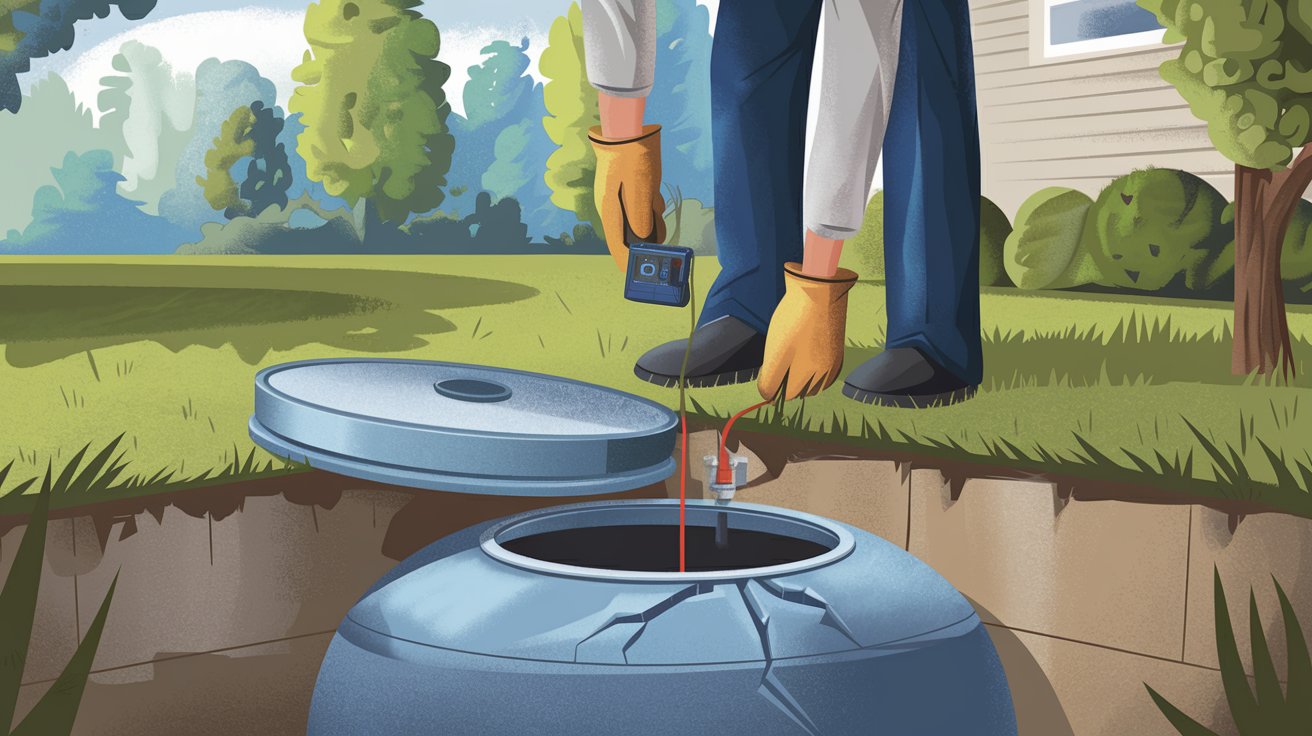Table of Contents
- Signs That Indicate Septic Tank Problems
- When Repairs Are Sufficient
- When Repair Isn’t Enough: Signs a Replacement Is Necessary
- Factors That Affect the Decision: Repair vs. Replacement
- How to Diagnose Septic Tank Issues
A septic tank is an essential part of a home’s wastewater treatment system, responsible for collecting and filtering sewage from the property. Over time, however, septic systems can experience wear and tear, leading to potential issues that require attention. Knowing when to repair a septic tank is crucial to maintaining its functionality and preventing costly replacements. In this article, we’ll explore the common signs that indicate repairs are necessary and how to determine if fixing your septic system will be sufficient. By identifying issues early, you can avoid more serious problems and ensure your septic tank continues to perform efficiently.
Signs That Indicate Septic Tank Problems
A septic tank that is in good condition typically works without any noticeable issues. However, certain signs can indicate that something is wrong. Recognizing these early warning signals is crucial for determining when to repair a septic tank before the problem escalates. Here are some common signs that your septic system may need attention:
1. Slow Drains and Toilets
If you notice that water is draining slowly from sinks, tubs, or toilets, it could indicate a blockage or buildup within the septic system. When the pipes leading to or from the tank are obstructed, it can prevent wastewater from flowing freely, causing backups.
2. Sewage Backups in the Home
One of the most alarming signs that your septic tank needs repair is sewage backing up into your home. This typically occurs when the septic tank is full, or there is a clog in the system. Immediate repairs are essential to avoid more severe damage.
3. Sewage Backups in the Home
One of the most alarming signs that your septic tank needs repair is sewage backing up into your home. This typically occurs when the septic tank is full, or there is a clog in the system. Immediate repairs are essential to avoid more severe damage.
4. Unpleasant Odors
Foul smells near your septic tank or in your yard are often a clear indication of a problem. This could mean that the septic tank is overflowing, or there are cracks or leaks that are allowing sewage to escape, leading to contamination and odor.
5. Pooling Water or Lush Vegetation
If you notice areas of pooling water or unusually green, lush vegetation over your septic tank or drain field, this could indicate a leak or overflow. Excess moisture can lead to these visible signs, which may point to a septic issue that requires repair.
6. Gurgling Sounds in Plumbing
Gurgling sounds coming from your plumbing are another red flag. These noises are often caused by air trapped in the pipes due to a blockage or an issue within the septic tank. This can disrupt the proper flow of wastewater and requires prompt attention.
By being vigilant and noticing these signs, you can address problems early on. Repairing a septic tank at this stage can prevent costly replacements and extend the life of your system. If you observe any of these issues, it’s essential to contact a professional to assess the situation and recommend the necessary repairs.
When Repairs Are Sufficient
Not all septic tank problems require a full replacement. In many cases, when to repair a septic tank depends on the type and severity of the issue. Some common issues are easy to fix with repairs that restore the functionality of your system without the need for a costly replacement. Here are a few scenarios where repairs are typically sufficient:
1. Clogged Pipes or Drain Field
Blockages in the pipes or the drain field can be resolved with professional cleaning. Over time, solids and scum can build up, causing the system to back up or slow down. A septic tank pumping or drain field cleaning can often clear these obstructions and restore proper flow, allowing the system to function normally again.
2. Damaged or Worn-out Filters
Many septic systems have filters that trap solids and prevent them from entering the drain field. Over time, these filters can become clogged or damaged. If a filter issue is the cause of poor performance, replacing the filter is a relatively simple and cost-effective repair.
3. Minor Cracks or Leaks
Small cracks in the septic tank or pipes are sometimes repairable. If a tank is not excessively damaged, a professional can seal minor leaks to prevent further contamination or issues. However, it is essential to ensure that the crack does not extend into critical parts of the tank, as this can compromise the tank’s ability to function.
4. Issues with the Pumping System
Some septic tanks rely on pumps to move wastewater from the tank to the drain field. If the pump is malfunctioning or blocked, the issue can typically be fixed by either cleaning or replacing the pump. This repair is usually more affordable than replacing the entire tank.
5. Tree Root Invasion
Tree roots can sometimes infiltrate the pipes or tank, causing blockages or leaks. In such cases, professionals can often remove the roots and repair any damaged sections of the pipes. This issue is manageable if caught early, and repairing the affected pipes can restore your septic system to full functionality.
In these cases, repairing the septic tank can extend its lifespan and keep the system running smoothly. However, the extent of the damage will ultimately determine if repair is a viable solution or if a full replacement is necessary. A professional inspection is the best way to determine whether repairs can resolve the issue or if the system has reached the point where replacement is the more cost-effective option.
When Repair Isn’t Enough: Signs a Replacement Is Necessary
While many septic tank issues can be resolved with repairs, there are times when a replacement is the only viable solution. If your septic tank has severe damage or has reached the end of its lifespan, repairing it may not be enough to restore its functionality. Here are some key signs that indicate a septic tank replacement is necessary:
1. Severe Tank Deterioration
Over time, the materials that make up a septic tank—such as concrete, steel, or fiberglass—can deteriorate due to age, exposure to harsh chemicals, or the surrounding environment. If the tank has extensive cracks, holes, or corrosion that cannot be repaired, a replacement will be needed. A severely deteriorated tank can no longer effectively contain wastewater, leading to contamination risks and the failure of the entire system.
2. Frequent Repairs
If your septic tank has been repaired multiple times over the years, it may be a sign that the system is nearing the end of its lifespan. Constant repairs are a red flag that the tank is no longer reliable, and a replacement could ultimately save you money in the long run. When repairs become frequent, the costs can add up, making replacement the more cost-effective solution.
3. Age of the Septic System
Septic tanks typically last between 20 to 30 years, depending on factors such as the material, usage, and maintenance. If your septic tank is approaching or has surpassed this age range, it may be time to consider replacing it. An old system is more likely to fail, and it may no longer meet the current environmental or building standards, making a replacement necessary.
4. Soil or Drain Field Failure
If your drain field is failing, it can cause wastewater to pool in your yard, leading to foul odors and potential contamination. Drain field failure can occur due to soil compaction, clogged pipes, or insufficient drainage. In some cases, repairing the drain field can be an option. However, if the soil or drain field is severely damaged, a full replacement of the septic system, including the drain field, may be necessary.
5. Environmental Concerns
A failing septic tank poses a serious environmental hazard, as untreated sewage can seep into groundwater or nearby water sources, contaminating the environment. If your septic system has been deemed a public health or environmental risk, a replacement will be required to ensure compliance with local regulations and avoid fines.
If you encounter any of these issues, it’s essential to consult with a professional to assess whether repairing the septic tank is feasible or if a complete replacement is needed. While replacing a septic system is a significant investment, it can prevent further damage, protect your property, and ensure that your wastewater is managed safely and effectively.
Factors That Affect the Decision: Repair vs. Replacement
Deciding whether to repair or replace a septic tank is not always straightforward. Several factors can influence this decision, and understanding them can help homeowners make an informed choice. Here are some key elements to consider when evaluating whether to repair or replace your septic system:
1. Age of the System
As mentioned earlier, the age of the septic tank plays a crucial role in determining whether repairs will be sufficient. If your system is over 20 years old, it may be more cost-effective in the long run to replace it rather than spend money on frequent repairs. Older systems are more prone to failures, and maintaining them could involve ongoing costs. If your septic tank is relatively young, repairs are more likely to restore its functionality.
2. Extent of the Damage
The severity of the damage is a significant factor in the repair vs. replacement decision. Minor issues like clogged pipes or worn-out filters can typically be repaired for a reasonable cost. However, more severe problems, such as structural damage to the tank or a failed drain field, may make repairs impractical. In such cases, replacement is often the better option. A professional inspection can help determine the extent of the damage and guide you toward the most cost-effective solution.
3. Cost of Repairs vs. Replacement
In some cases, repairing a septic tank may be cheaper in the short term, but frequent repairs can add up. It’s important to weigh the costs of ongoing repairs against the potential costs of a replacement. While a septic tank replacement is a significant upfront investment, it can save you from recurring repair costs and provide peace of mind knowing that your system will function properly for years to come.
4. Property Size and System Type
The size of your property and the type of septic system you have can also influence the decision. If you have a small property with a simple septic system, repairs might be all that’s needed. However, larger properties with more complex systems may require more extensive repairs or a full replacement, especially if the system is outdated or incompatible with current regulations.
5. Environmental and Health Concerns
A failing septic system poses risks not only to your property but also to the surrounding environment and public health. If your septic tank is leaking wastewater into the ground or water sources, it can contaminate the local water supply and create serious health hazards. In such cases, replacing the system is often necessary to avoid environmental damage and comply with health and safety regulations.
6. Local Regulations
Depending on where you live, there may be local or state regulations that influence whether repairs or a replacement is the best option. Some areas have strict environmental standards that require the use of modern septic systems that meet current codes. If your system is outdated or doesn’t meet local regulations, replacement might be the only option, even if repairs could fix the immediate issues.
When deciding when to repair a septic tank versus replacing it, consider these factors carefully. A professional inspection is essential in helping you make an informed decision. Ultimately, whether you choose to repair or replace your septic tank, the goal is to ensure that your system is functioning properly, safe for the environment, and compliant with local regulations.
How to Diagnose Septic Tank Issues
Diagnosing septic tank issues early is essential for determining whether repairs are sufficient or if a replacement is needed. With regular maintenance and proper monitoring, you can catch problems before they become costly or hazardous. Here’s how to diagnose septic tank issues effectively:
1. Schedule Regular Inspections
One of the most effective ways to diagnose septic tank issues is through routine inspections. Professional septic tank inspectors can assess the condition of your system, including the tank, pipes, and drain field, and identify any potential issues. Regular inspections—recommended every 3 to 5 years—can help you catch problems before they escalate and provide valuable insights into the overall health of your septic system.
2. Watch for Common Signs of Trouble
Keep an eye out for the common warning signs discussed earlier, such as slow drains, sewage backups, foul odors, pooling water, and gurgling pipes. These issues can indicate that something is wrong with your septic system and should be addressed promptly. If you notice any of these symptoms, it’s a good idea to contact a professional for further assessment.
3. Check for Visible Damage
You can also check the area around your septic tank and drain field for visible signs of damage. Look for pooling water, excessively lush vegetation, or unusual dampness in your yard. These can indicate leaks or blockages in the system. Be cautious not to disturb the area too much, as this can interfere with the professional evaluation later on.
4. Monitor Wastewater Flow
Pay attention to how wastewater flows in your home. If you notice frequent backups, sluggish drainage, or gurgling sounds, these may be early indicators of septic tank trouble. Additionally, if your tank is more than a decade old, the pipes and connections may start to wear out, and flow issues may indicate that repairs are needed.
5. Perform a Simple Dye Test
A simple dye test can help determine if wastewater is leaking from your septic tank. This involves flushing a non-toxic dye (available at most home improvement stores) down the drain and observing whether it appears in your yard or elsewhere on your property. If the dye shows up in areas it shouldn’t, it indicates a leak or malfunction that needs attention.
6. Consult a Professional
While some homeowners can spot early signs of septic system issues, diagnosing complex problems requires expertise. Consulting with a professional septic tank service provider is essential for an accurate diagnosis. They can perform a thorough inspection of your system, including checking for leaks, cracks, and the overall condition of the tank. If repairs are needed, they can offer expert recommendations and help determine whether the damage is repairable or if a replacement is the better option.
By staying vigilant and proactive about septic tank maintenance, you can avoid major issues and ensure your system runs smoothly for years to come. A timely diagnosis can save you money, prevent health hazards, and help extend the life of your septic system. If in doubt, always consult a professional to assess the situation and guide you toward the best solution.
Knowing when to repair a septic tank is essential for homeowners looking to avoid expensive replacements and ensure their system functions efficiently. Recognizing the signs of trouble early—such as slow drains, sewage backups, and foul odors—can help you address problems before they escalate. In many cases, repairs can restore the septic tank to good working order, saving you money and extending the life of your system. However, severe damage or aging systems may require replacement to prevent further issues and protect your property.
Regular maintenance and professional inspections are key to diagnosing problems early and making informed decisions about repairs versus replacement. If you’re unsure about the condition of your septic system, don’t hesitate to consult with a septic tank professional who can provide an expert evaluation.
Septic Regulations in Rural Areas: Essential Guide for Rural Property Owners
The Role of Perforated Pipes in Drain Fields
What Happens During a Pumping Service?
Septic Tanks vs. Sewer Systems | Choosing the Right Option
Directory | Virginia Septic Service Providers | Part 2
Directory | Virginia Septic Service Providers : Best Professionals | Part 1







